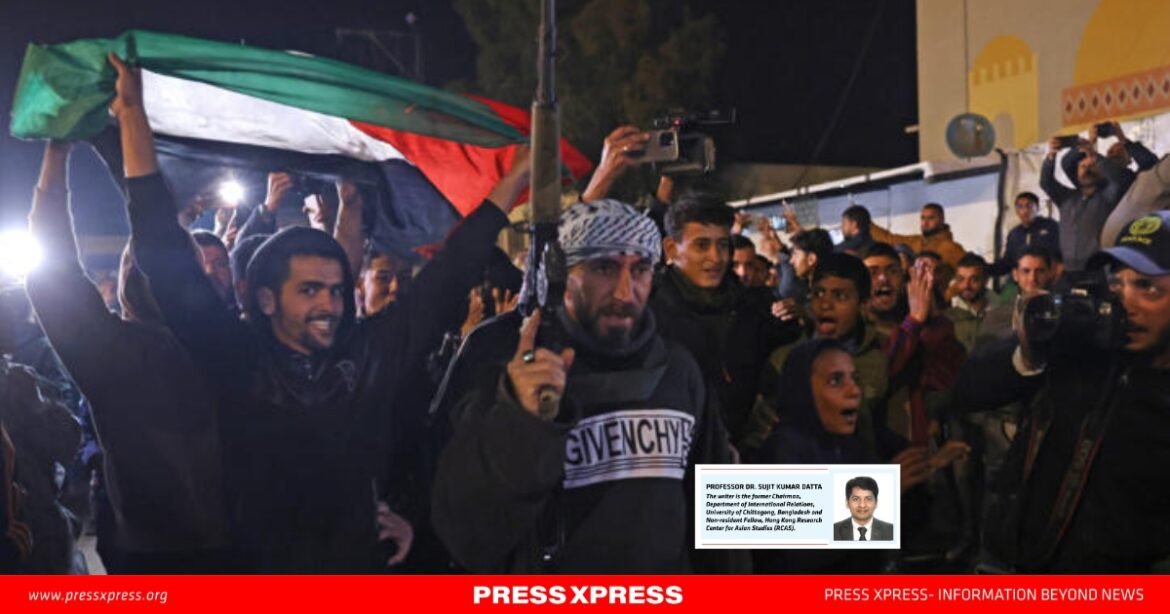The ceasefire’s longevity is contingent upon establishing a political framework that ensures permanence between antagonists, necessitating ongoing collaboration and commitment to preserving peace and prosperity for Gazans
The enduring bloodshed in Gaza is far more than simply a geographic conundrum but rather a complex tableau of global politics. The warfare between Israel and Hamas has disrupted the lives of millions, leaving in its wake untold suffering. The armistice brought fresh hope in this time of strife and discord. However, queries have emerged about whether tranquillity can endure. It is not merely a cessation but rather a political understanding, and its future rests upon the alignment of diverse factions.
The conflict between Israel and Hamas has fashioned an exceptionally dire circumstance not exclusively for the inhabitants of Gaza but for the entire region. Just recently, Israel and Hamas agreed to a ceasefire accord in Gaza, unveiling novel possibilities. However, the interrogation remains: Is the warfare in Gaza ending? A novel skyline has materialized with the declaration of the armistice. As outlined in the ceasefire contract, Israeli forces will be withdrawn from Gaza along with the emancipation of hostages and detainees.
Qatar and Egypt are brokering the pact, which has initiated innovative negotiations at the international level. Attempts at armistice have been made repetitively throughout the Gaza warfare, but each time it has broken down. However, this time, Israel and Hamas have agreed to a ceasefire accord. Per the agreement, phases will be taken to liberate hostages and prisoners, which is perceived as a significant step forward.
Qatar and Egypt are brokering the deal, elevating hopes for concord in the region. The initial stage of the ceasefire will initiate on January 19, which will persist for 6 weeks or 42 days. During this period, measures will be undertaken to free inmates and withdraw Israeli forces from Gaza.
The Prime Minister of Qatar, Sheikh Mohammed bin Abdul Rahman bin Jassim Al Thani, divulged this guidance. It was a high-level diplomatic initiative in which Al-Thani declared that a ceasefire understanding had been achieved due to the joint endeavors of Qatar and Egypt to conclude the warfare in Gaza.
The deal is functioning not solely between the two factions but in addition with the backing of the global community, where both the next US President, Donald Trump, and the Biden administration have exhibited enthusiasm. As per Trump’s remarks, “We have an agreement for the hostages in the Middle East. They will be released exceedingly soon.” The Trump administration’s interest and concentration will gain novel momentum after the merger.
The next US President Donald Trump played a distinctive role in this pact. He has rendered this issue public through various posts. Under his leadership, the US national security team is working intimately with Israel and allies to confirm that Gaza is never again a sheltered haven for terrorists.
The Biden administration declared that it was working as a unit to restore peace to Gaza. Soon, their schemes will be exposed, and the preliminary 6-week truce may last longer. An important aspect of the ceasefire accord is humanitarian aid. Gaza is a war-ravaged country, and its inhabitants are in a dire humanitarian crisis.
International teamwork is crucial to the release of detainees and support for war victims. Sending relief to the war-ravaged would heighten their hope of starting a renewed life. In this case, there is also a discussion of sending humanitarian support to the war casualties. The inhabitants of Gaza urgently need help to overcome the emergency they have faced as a consequence of the warfare.
Qatari Prime Minister Al Thani asserted, “We are happy to declare that the joint initiatives of Qatar and Egypt to conclude the ongoing warfare in Gaza have been successful.” This aid is an important step in restoring new life to war-torn Gaza. While a ceasefire is conceivable, it has some difficulties.
One of the main difficulties is to what extent this agreement will be effective and to what extent it will be implemented. The situation in Gaza is exceedingly complicated, and if the circumstances improve somewhat, the border clash could reemerge. The strife between Hamas and Fatah is also an obstacle to this peace. Reconciliation between them is necessary to render the ceasefire permanent. Otherwise, their aftermath will pose a central obstruction to enduring peace.
Several significant crises remain within the ceasefire accord. First, interregional consensus is essential for lasting peace. If only the release of detainees and legal issues were resolved, would the situation last? Second, the extent to which the spending disaster for reconstruction in war-ravaged regions will be assured after the ceasefire is also open to query.
If properly nurtured, the Gaza ceasefire agreement holds the potential for a new beginning. A political reconciliation process could emerge from what began as solely a cessation of violence. While questions linger around its longevity, maximum cooperation between parties may herald a watershed moment of peace for Gaza’s populace. Only time will reveal the ultimate consequences of this fragile accord.
However, the hope sparked by this deal undeniably invites constructive development. The ceasefire’s longevity is contingent upon establishing a political framework that ensures permanence between antagonists, necessitating ongoing collaboration and commitment to preserving peace and prosperity for Gazans.
The establishment of a firm agreement between Israel and Hamas has the potential to introduce a new perspective for the residents of Gaza. The international partnership proves essential for conflict resolution’s sustainability.
The momentum towards comprehensive Middle Eastern amity could expand if cooperation maintains the current calm. Nevertheless, this gleam of expectation signifies the redoubling of intensive peace-forging efforts, as time will reveal. Additional proactive measures are necessary to prevent future conflicts.


